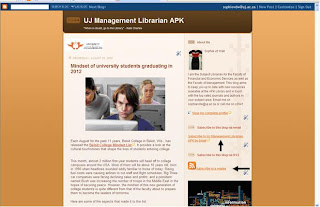 Keeping Track of Students, and Staying in Touch
Keeping Track of Students, and Staying in Touch
At first, the idea sounds deceptively simple. Software that lets professors manage their office hours and keep tabs on their students?
Isn’t a
daybook enough?
For some faculty members, a pen and paper — or a well-organized e-mail inbox — might be enough. But a new start-up company,
Starfish Retention Solutions, based in northern Virginia is betting that its forthcoming services will fill a need that many colleges don’t realize they have — and boost retention and student success along the way.
Five Secrets to Publishing Success/ By
Thom BrooksFor many young academics (whether graduate students or assistant professors preparing their tenure files), the subject of publishing is a source of anxiety and consternation. In addition, whether or not one has a sound understanding of publishing more often than not is true thanks to being teamed up with a helpful supervisor. Thus, what most young academics know about publishing is only limited to what little they may have heard from helpful — and often not so helpful — mentors. In this essay, Thom will uncover what he believe are five secrets to publishing success. (Secret #1: Finding your voice, Secret #2: The importance of focus;Secret #3: Rejection is the norm;Secret #4; Getting a book contract;Secret #5: Publishing takes time)
 Suicidal Thoughts Are Common Among College Students, Study Suggests
Suicidal Thoughts Are Common Among College Students, Study SuggestsA study of 26,000 students at 70 colleges and universities suggests that suicidal thoughts are not rare among that population, with more than half of the responders reporting they have thought about suicide and 15 percent reporting they have seriously considered ending their lives. More than 5 percent reported attempting suicide sometime in their lives. .
British Universities Offer Cash to Get Students to Enroll in Unpopular ProgramsSeveral British universities apparently are offering cash incentives to students to induce them to enroll in unpopular degree programs.
Finland, Like Sweden, to End Free Study for Some ForeignersSome foreign students in Finland will be charged tuition beginning in 2010, if a new university law drawn up by the government is approved and goes into effect, as expected, in late 2009.
 Siege mentality
Siege mentality
A fortnightly series in which academics step outside their area of expertise. Terence
Kealey reveals how hypocrisy, violence and torture in the America of George Washington have helped create the US of George Bush
Filtering tips/ Rebecca AttwoodApplications from would-be students are increasingly less likely to be seen by an academic as universities turn to new ways to sieve the burgeoning number of applications.
Grappling with the digital divide / Hannah
FearnStudents are increasingly 'transliterate', communicating across a range of technologies. Can academics keep up?
 GLOBAL: University world rankings
GLOBAL: University world rankings/ Geoff
MaslenUniversities in the United States have again dominated the world's top 500 in the latest rankings by Shanghai
Jiao Tong University. It is the sixth year since the Chinese university began listing the world's top higher education institutions and once more, US universities have taken 17 of the first 20 places and 55 of the top 100. This compares with America's main competitor - Britain - which managed to squeeze only two of its universities in the top 20 and a mere 10 in the first 100.
GREECE: Cheque-book higher education /
Makki Marseilles
The first step towards privatisation of higher education in Greece has been taken by the government despite strong opposition from the academic community, political parties, educational trades unions as well as parents and students at large.
CHINA: Rise of research in the Middle Kingdom/ Simon
MarginsonA notable development of the last decade was the pluralisation of research capacity in the sciences. Between 1995 and 2005, the annual number of scientific papers produced in China rose from 9,061 to 41,596. China was poised to overtake UK and Germany at the top of the EU table though its output remained less than one fifth that of the EU as a whole.





















